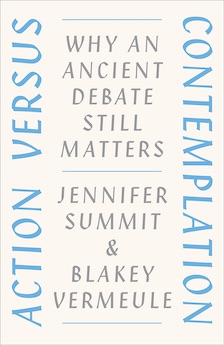Shortlisted for the 2019 Ralph Waldo Emerson Award
By Fred H. Lawson
Should we take immediate steps to remedy the problems that plague the contemporary world before they overwhelm us, or instead devote time and effort to framing those problems precisely, evaluating potential solutions carefully, and laying the foundations necessary to implement the most satisfactory responses? Jennifer Summit and Blakey Vermeule claim that this crucial conundrum can be traced to the dawn of western thought, and that the distinction between doing the right thing and considering what would be the right thing to do was introduced by none other than Aristotle, who “should have ended [the debate over these two notions] before it began.”
Whether to deal at once with burgeoning problems or pause to deliberate how best to handle them has become more perplexing than ever, due to the emergence of what Summit and Vermeule call “later modernity” or “late capitalism,” a state of affairs that other observers have termed late modernity, fast capitalism, or the information economy. Current circumstances put a premium on practical problem-solving (which the authors call “action”), and devalue both abstract theorizing and efforts to find meaning in events (which they conflate as “contemplation”). Furthermore, at the present moment “‘action’ has been reduced to ‘busy-ness’ and its surfeit, ‘stress,’ [while] contemplation has been reduced to ‘relaxation’ and its accompanying, negative attributes—laziness, boredom, and waste of time.” What must be done is to restore “the delicate balance of action and contemplation that gives both terms deep significance: action without contemplation becomes meaningless, just as contemplation without action becomes purposeless.”
Fair enough. Yet Summit and Vermeule mix together five sets of binaries that might better be kept analytically distinct. The first is action versus contemplation. The second is short time horizons versus longer time horizons. The third is living in accordance with what ensures one’s physical survival versus living in accordance with what engages one’s passions. The fourth is “productive labor” versus “nonproductive leisure.” And the fifth is the household versus the public arena, or alternatively the sacred versus the secular. Of course these aspects of reality overlap. It makes sense to expect that conceptual pursuits accompany longer time horizons and often demand considerable personal (and familial) sacrifice (think Karl Marx), whereas practicality goes hand in hand with immediacy and a more comfortable, if unreflective, life (think Charles F. Kettering). But it also makes good sense not to begin even the most mundane task unless one has thought things through as thoroughly as possible and taken future ramifications into account: “Measure twice, cut once,” as expert carpenters advise.
Being humanities professors, Summit and Vermeule cannot help associating action with such fields as engineering, business, and public policy and contemplation with philosophy, art history, and English literature. Few members of Phi Beta Kappa would dispute their conviction that mastering the latter disciplines is more fulfilling, and may even be more useful in an increasingly fluid vocational environment, than the former. But the distinction between action-focused knowledge and contemplation-oriented wisdom does not map very well onto specific scholarly specialties. Surely mechanics, accountants, and city managers engage in both practical problem-solving and abstract theorizing, as do ethicists, museum curators and poetry critics. John Dewey is indeed correct—drawing a bright line to separate the “practical” from the “intellectual” subverts both endeavors.
Summit and Vermeule go on to link the project of blending action and contemplation to the ongoing campaign to transcend existing boundaries among scholarly disciplines. Bioethics, optogenetics, and sustainability studies are singled out for honorable mention. The authors quote Howard Rheingold in support of “transdisciplinarity[, which] goes beyond bringing together researchers from different disciplines to work in multidisciplinary teams. It means educating researchers who can speak languages of multiple disciplines [sic].” Two basic questions regarding this linkage are worth serious consideration: How highly trained do transdisciplinarians need to be in each of the superseded disciplines? And must these two grand enterprises be carried out simultaneously? It is a fact that many colleges and universities in the United States have taken steps not only to reintegrate action and contemplation but also to dismantle long-standing majors and departments. To what extent these institutions have done so in a truly deliberative way—rather than for marketing, cost-cutting, or campus-political purposes—is much less obvious.
Fred H. Lawson (ΦBK, Indiana University) is Professor of Government Emeritus of Mills College, and sometime Visiting Fellow of St. Antony’s College, Oxford.




